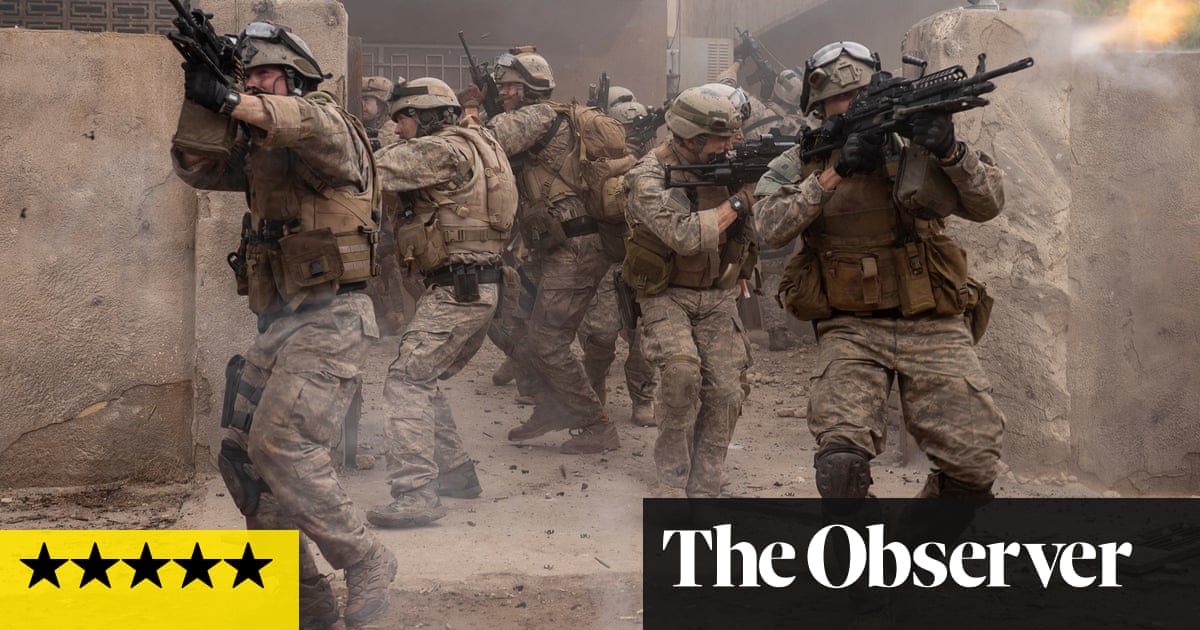It’s up there with the first 23 bruising minutes of Steven Spielberg’sSaving Private Ryanor Elem Klimov’s harrowing and relentlessCome and See. This is film-making that doesn’t just show you the horrors of war; it forces you to taste the dust and the choking panic, smell the fear and the cordite and the tinny metallic tang of spilled blood.Warfare, by Alex Garland and Ray Mendoza, is the most forceful and unflinching depiction of combat since Edward Berger’s 2023 Oscar-winningAll Quiet on the Western Front. It’s also one of the boldest and most formally daring.
There are certain conventions at play in most war movies. Among them is the unwritten rule that however blisteringly hellish the depiction of combat, there’s a mitigating audience sop in the form of a flag-waving message about the nobility of the cause. Or, at the very least, some attempt at sentimental string-pulling to knit an emotional attachment to the characters. ButWarfare, a forensic, close to real-time re-enactment of a 2006 battle fought during theIraqwar, rejects all that. Co-written and co-directed by Garland and former US Navy Seal Mendoza, the film’s radically stripped-back approach gives us next to no background on the characters, a platoon of Seals, or the operation, a surveillance mission in the Iraqi city of Ramadi. Nor does it take a stance on any moral questions about the Iraq war. Instead, it focuses on evoking, with almost unbearably visceral intensity, the experiences of a group of highly trained professionals who have been hired to do a job. And they are having a really bad day at work.
It helps that the cast – a roster of some of the best and brightest rising talents from both sides of the Atlantic – is exceptional. Canadian actorD’Pharaoh Woon-A-Taiis a watchful, weighty presence as the younger Mendoza, on whose memories the film is largely based.Will Poulteris Erik, the commanding officer coming apart before our eyes;Joseph Quinnis the brash, wise-cracking Sam, front and centre in the blast of energy, powered by Eric Prydz’s pumping EDM bangerCall on Me, which opens the film.Cosmo Jarvisis Elliot, a laconic old hand;Kit Connoris Tommy, the eager newbie with a pink-cheeked flush of schoolboy enthusiasm. AndMay Decemberbreakout star Charles Melton is unflappable, efficient platoon leader Jake. The success ofWarfareis less about the individual performances, however, than it is about the way they effortlessly fit together. The bond between these men, whether during the grinding monotony of endless waiting or at the sharp edge of battle, is almost a character in its own right.
Perhaps not surprisingly, given the doubts about its legitimacy, the Iraq war on film has traditionally been a tough sell to audiences. Kathryn Bigelow’s steely dramaThe Hurt Lockerwon six Oscars, including best picture, but it didn’t exactly set the box office alight. Clint Eastwood’s solidAmerican Sniperwas a rare exception – an Iraq war film that was a notable commercial success. Eastwood’s free hand when it came to emotional button-pushing, plus Bradley Cooper chewing his way through a damaged hero narrative, certainly didn’t hurt the film’s prospects.
It remains to be seen whetherWarfarewill suffer from Iraq aversion. Certainly, audiences who balked at the lack of political context in Garland’s previous picture, last year’s similarly bruisingCivil War, may level the same criticisms here. But that would be missing the point: this is a film about the bullet-strafed, boots-on-the-ground realities of war rather than the geopolitical gamesmanship behind it. As such, it feels closer to Tim Hetherington and Sebastian Junger’s 2010 documentaryRestrepo, about a platoon of soldiers posted in Afghanistan, than it does to more traditional Hollywood war movies.
By peeling away the celebratory trappings, the valour and the glory and the duty to God and country,Warfarelays bare an awful lot of questions. The overriding impression, once the adrenaline has drained away, is of futility, waste and pointless destruction. As the Seals make their final, nerve-shredding exit from the house they occupied, now coated in a layer of rubble and blood, one of the Iraqi women whose home the soldiers commandeered approaches an American, pleading to know: “Why? Why?” He offers no answer, and neither does the film. And that in itself is the point.
